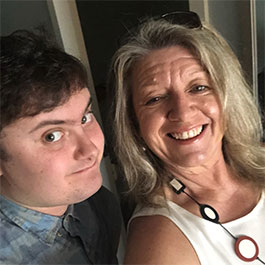Survey reveals how regional carers are faring under the NDIS
Categories
Share
/prod01/channel_8/media/scu-dep/news/images/2020/ndis-720-475.jpg)
A Southern Cross University report has identified the new challenges carers face as they have adapted to the National Disability Insurance Scheme (NDIS) being rolled out in regional New South Wales.
The report is the result of an 18 month study in which 70 carers from the NSW mid north coast were surveyed about caring for a person with a disability shortly after becoming part of the NDIS.
One of the main findings was the need to improve the wellbeing of carers and to ease the significant administrative burdens many face when dealing with the complex NDIS system.
The University’s Professor of Mental Health John Hurley headed up the survey and identified a blend of both positive and challenging outcomes for carers in this study and an increase some self-care strategies.
“Carers reported physical and psychosocial improvements for NDIS participants and experienced improved family relationships as they were able to focus more on personal relationships rather than caring roles,” Professor Hurley said.
“But it’s concerning that there still exists a higher than average risk for depression, demonstrating that carers still face wellbeing challenges. As a result, there’s a need to increase the training, qualifications and capabilities, but we don’t have enough services in regional NSW to fully meet the needs of the NDIS participants.”
One of those involved with the study, Jo Magill, from Sawtell, appreciates the flexibility the NDIS allows her.
“Because I’m self-managed I can choose which providers I can call upon to look after my disabled son,” said Ms Magill.
“I think the NDIS still has teething problems but overall I’m quite supportive of the scheme.”
The report was partly funded by NSW Department of Communities and Justice and has been submitted to the National Disabilities Agency for further consideration.

Details of the Southern Cross University study can be found here.

/prod01/channel_8/media/scu-dep/current-students/images/Coffs-harbour_student-group_20220616_33-147kb.jpg)
/prod01/channel_8/media/scu-dep/current-students/services/counselling/images/RS21533_English-College-Student_20191210_DSC_6961-117kb.jpg)
/prod01/channel_8/media/scu-dep/study/scholarships/images/STEPHANIE-PORTO-108-2-169kb.jpg)
/prod01/channel_8/media/scu-dep/study/arts-and-humanities/images/RS20958_Chin-Yung-Pang-Andy_20190309__79I5562-960X540.jpg)
/prod01/channel_8/media/scu-dep/experience/images/SCU-INTNL-STUDY-GUIDE-280422-256-72kb.jpg)
/prod01/channel_8/media/dep-site-assets/component-library/screenshots/online-1X1.jpg)
/484x0:1516x1032/prod01/channel_8/media/scu-dep/news/images/2025/Bonnie-landscape.png)
/514x0:1487x973/prod01/channel_8/media/scu-dep/news/images/2025/Luxury-accommodation-at-Springbook-Qld_credit-Josh-Withers-on-Unsplash-2000X973.jpg)
/514x0:1487x973/prod01/channel_8/media/scu-dep/news/images/2025/Ramadan-food-nuts-and-dates_credit-Anntarazevich-on-Pexels-2000X973.jpg)
/514x0:1487x973/prod01/channel_8/media/scu-dep/news/images/2025/Vegetables-at-market_credit-Inigo-de-la-Maza-on-Unsplash-2000X973.jpg)
/514x0:1487x973/prod01/channel_8/media/scu-dep/news/images/2025/Ozempic-pen_credit-Haberdoedas-on-Unsplash-2000X973.jpg)
/484x0:1516x1032/prod01/channel_8/media/scu-dep/news/images/2025/rajasthan-royals.png)
/493x0:1698x1205/prod01/channel_8/media/scu-dep/news/images/2024/Nursing-students-in-India-IMG_8611.jpeg)
/514x0:1487x973/prod01/channel_8/media/scu-dep/news/images/2024/Child-playing-at-beach_credit-Leo-Rivas-on-Unsplash-2000X973.jpg)
/438x0:1563x1125/prod01/channel_8/media/scu-dep/news/images/2024/Dr-Stephen-Daniells8-1-132kb.jpg)
/438x0:1563x1125/prod01/channel_8/media/scu-dep/news/images/2024/Naturopathic-Medicine-Discipline-Video-Shoot_202200822__DSC_0573146-1-135kb.jpg)